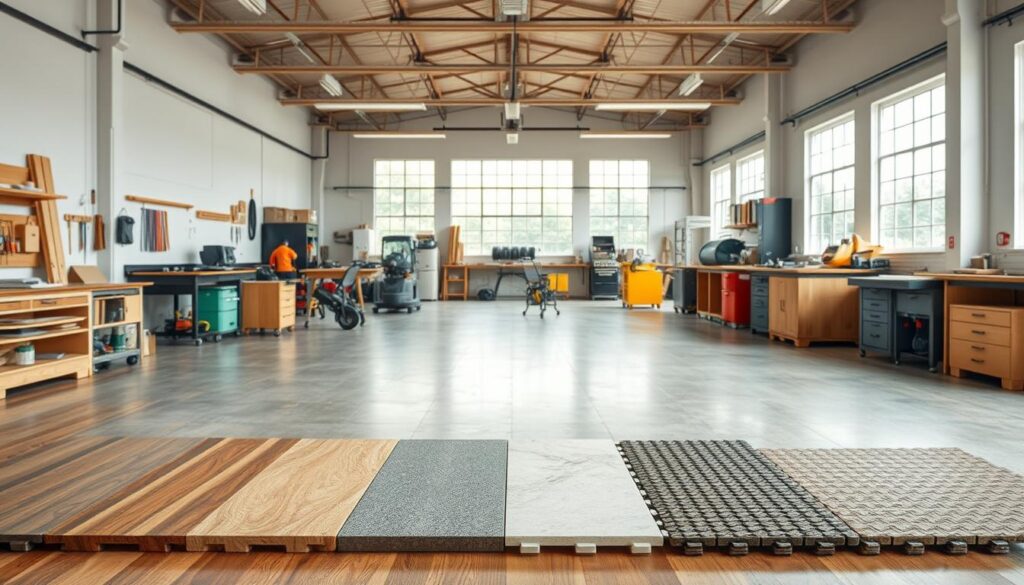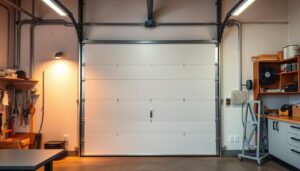Are you struggling to find the perfect flooring for your workshop or garage? With various activities and environmental conditions to consider, selecting the right floor can be a daunting task.
The ideal flooring solution should enhance productivity, comfort, and safety in your workspace. With numerous options available in the UK market, making an informed decision can be challenging.
This comprehensive guide will walk you through the various flooring solutions, exploring their advantages and disadvantages to help you make the right choice for your specific needs.
Key Takeaways
- Understand the key factors to consider when selecting workshop flooring
- Explore popular flooring solutions, including epoxy coatings and rubber flooring
- Learn how different flooring options impact productivity, comfort, and safety
- Discover specialised alternatives for unique workshop needs
- Make an informed decision about the most suitable flooring for your workspace
Understanding Workshop Flooring Requirements
Selecting the appropriate flooring for your workshop involves understanding the demands of your work and the conditions within the space. To make an informed decision, you need to assess your specific needs and how you use the workshop.
Assessing Your Workshop Activities and Needs
Begin by thoroughly assessing the primary activities that will take place in your workshop space, such as woodworking, metalworking, or vehicle maintenance. Consider the types of tools and equipment you’ll be using and how they might impact your flooring requirements. For instance, heavy machinery, sharp tools, and chemicals can all affect the durability and safety of your flooring.
The Impact of Proper Flooring on Productivity and Safety
Proper flooring directly contributes to productivity by reducing fatigue during long periods of standing and providing appropriate support. Moreover, the right flooring can enhance safety by offering slip resistance, impact absorption, and protection from falling tools or equipment. By choosing the right workshop flooring, you can create a more efficient and secure working environment.
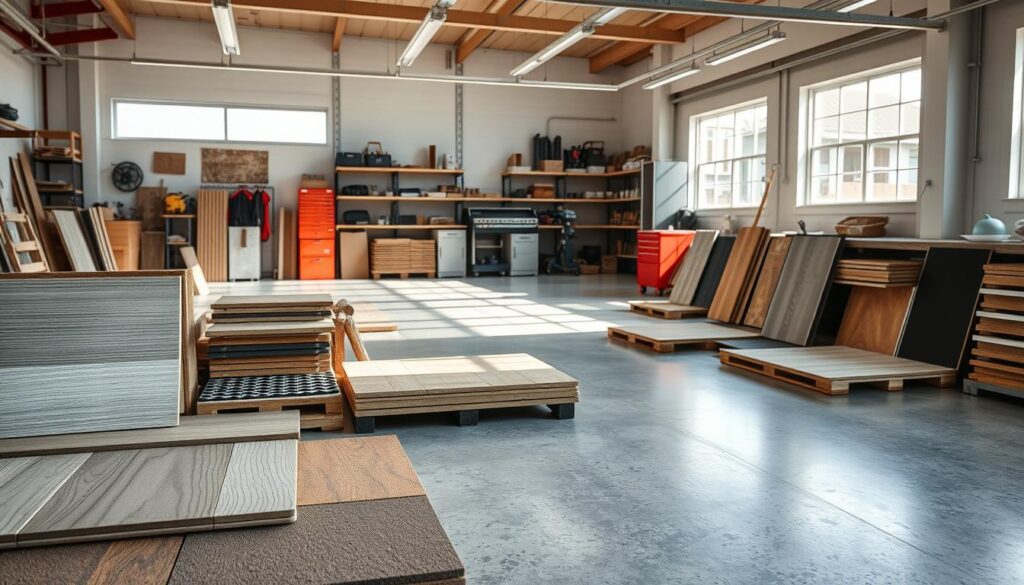
Key Factors in Choosing Workshop Flooring Options
To determine the most suitable workshop flooring, you must consider various critical aspects. The right flooring can significantly impact the productivity, safety, and overall efficiency of your workshop.
Durability and Load-Bearing Capacity
When selecting workshop flooring, durability should be a top priority. The flooring needs to withstand heavy machinery, dropped tools, and constant foot traffic. Evaluate the load-bearing capacity to ensure it can support your heaviest equipment without damage or indentation.
Comfort and Fatigue Reduction
Comfort is another crucial factor, as it can reduce fatigue during long workshop sessions. Consider flooring with good shock absorption, resilience, and thermal properties to create a more comfortable working environment.
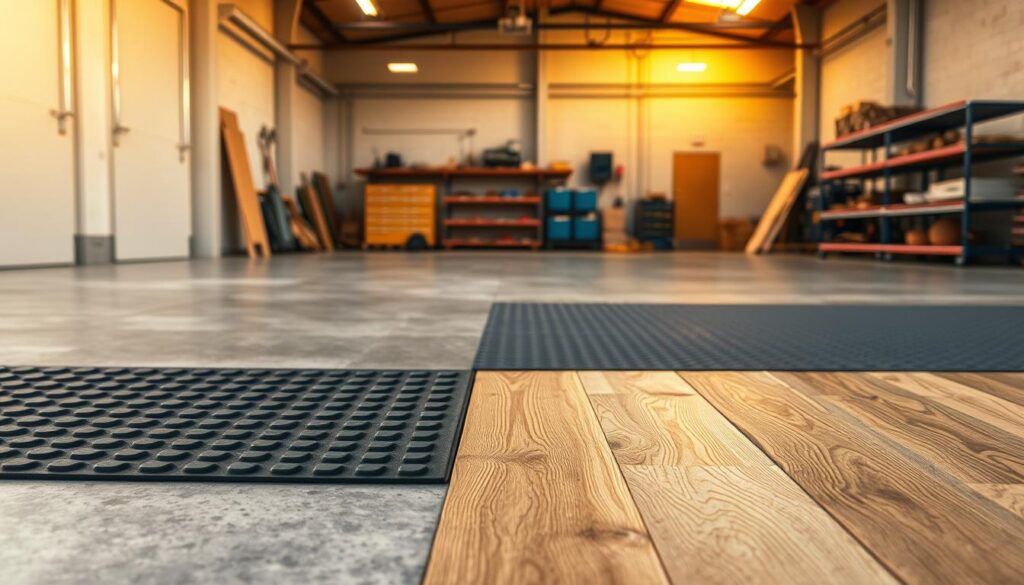
Maintenance Requirements and Cleaning
Assess the maintenance requirements of each flooring type, including resistance to stains, ease of cleaning, and long-term care needs. Understanding how different flooring materials respond to common workshop substances is vital to prevent permanent damage.
By considering these key factors, you can make an informed decision when choosing the most appropriate workshop flooring for your needs.
Epoxy Coating: A Popular Workshop Solution
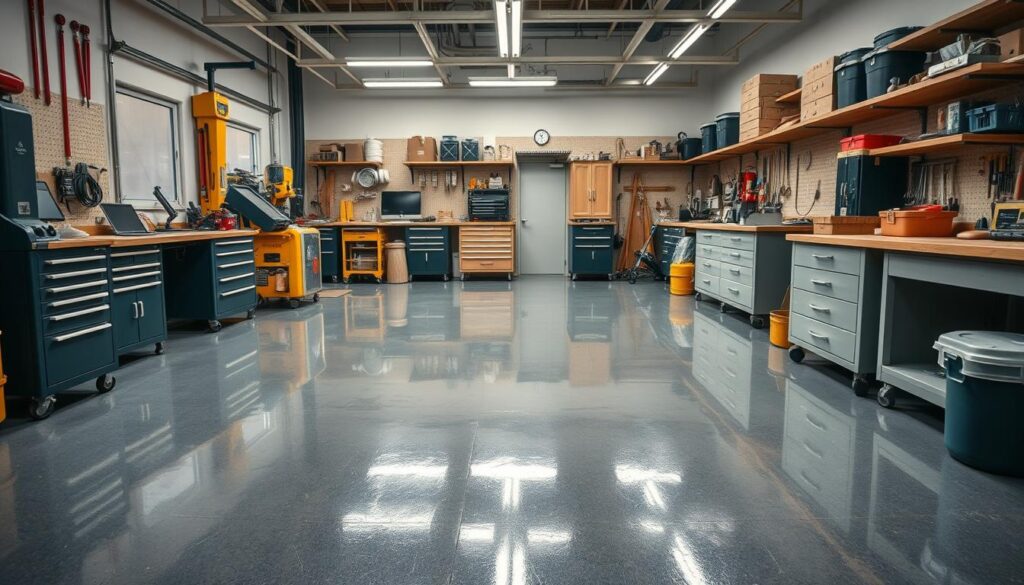
Epoxy coating offers a robust and long-lasting flooring solution that is well-suited to the demands of a workshop environment. This popular choice among professionals provides numerous benefits, making it an ideal option for many.
Benefits of Epoxy Flooring
Epoxy flooring provides an exceptionally durable and seamless surface that’s highly resistant to chemicals, oils, and other workshop contaminants. The reflective properties of epoxy coatings can significantly improve workshop lighting, creating a brighter and more productive work environment. Professional epoxy applications typically include non-slip additives and decorative flakes that enhance both safety and aesthetic appeal.
Limitations and Installation Considerations
While offering excellent durability, epoxy floors provide little comfort or fatigue reduction, making supplemental mats necessary in high-traffic standing areas. Installation requires thorough preparation of the concrete substrate, including cleaning, etching, and potentially filling cracks or imperfections. You should consider both DIY epoxy kits and professional installation, weighing the cost savings against the superior durability and finish quality of professional application.
Epoxy coatings typically offer excellent value, with professionally installed systems costing around £2.40 per square foot while providing years of service, making it a viable flooring solution for your workshop.
Rubber Flooring Options for Workshops
Rubber flooring is an excellent choice for workshops, offering superior shock absorption and anti-fatigue properties.
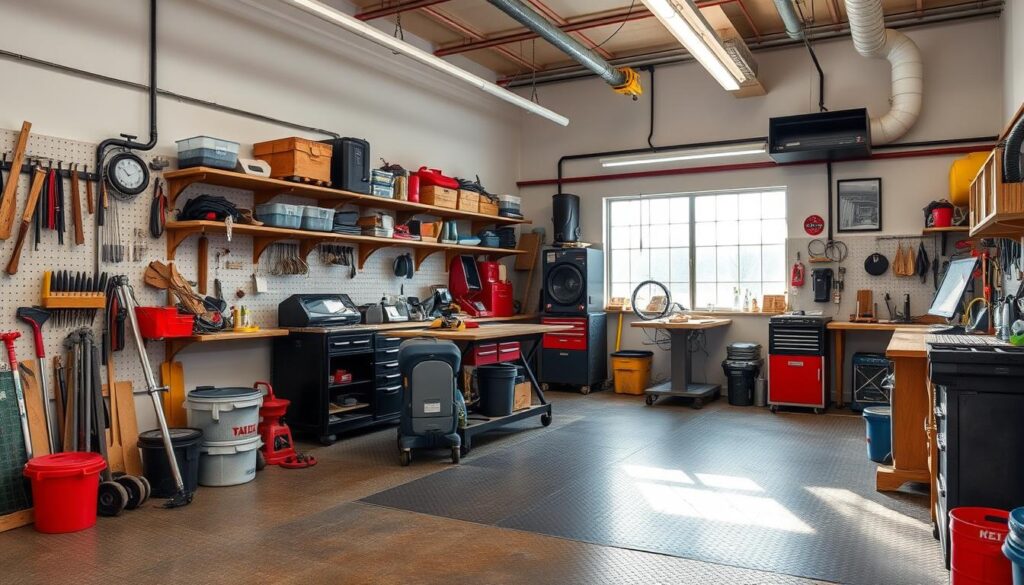
Rubber flooring provides comfort and safety in workshop environments. It is available in various forms, including mats and interlocking tiles.
Rubber Mats vs. Interlocking Rubber Tiles
Rubber mats are a popular choice for workshops due to their ease of installation and comfort underfoot. Interlocking rubber tiles, on the other hand, offer flexibility and ease of replacement. When choosing between the two, consider factors such as installation ease, stability, and replacement options.
The choice between rubber mats and interlocking tiles depends on your specific workshop needs. Both options provide excellent shock absorption and sound dampening properties.
Ideal Applications for Rubber Flooring
Rubber flooring is ideal for areas around workbenches, machinery stations, and high-traffic pathways in your workshop. It reduces noise from dropped tools and machinery operation, creating a safer working environment.
Consider the environmental benefits of rubber flooring, as many options are made from recycled materials and are recyclable at the end of their life. Evaluate the cost considerations of different rubber flooring options, balancing initial investment against longevity and performance benefits.
PVC and Vinyl Interlocking Tiles
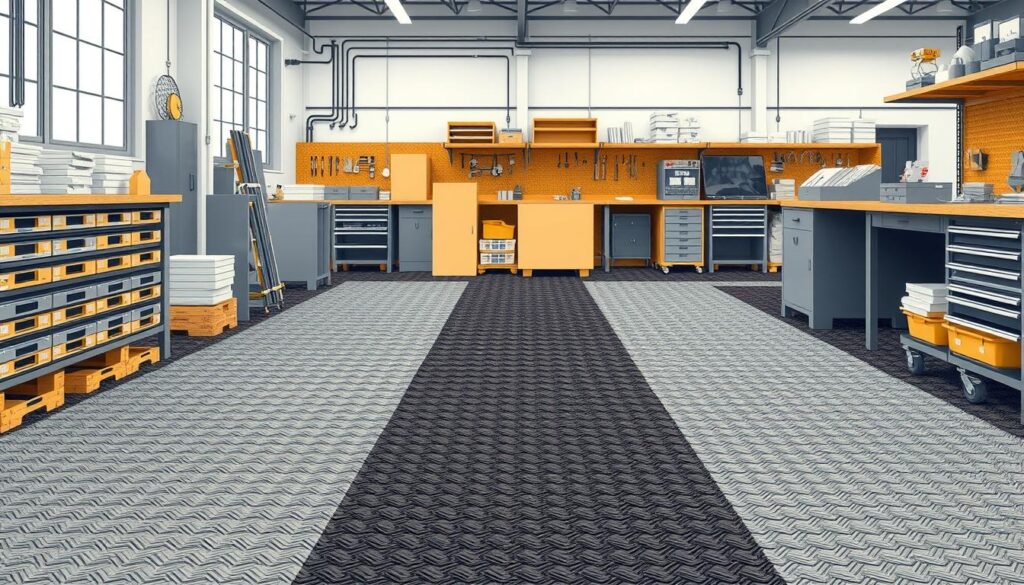
If you’re looking for a flooring solution that combines durability with ease of installation, PVC and vinyl interlocking tiles are an excellent choice. These tiles offer exceptional durability while being lighter and often more affordable than rubber alternatives.
Strength and Versatility Features
PVC and vinyl interlocking tiles feature various surface patterns, including gridlock, checkerlock, and pennylock, which provide different levels of traction and aesthetic appeal for your workshop. The load-bearing capabilities of different PVC tile thicknesses can accommodate heavy workshop equipment and vehicles, making them a versatile option.
Installation and Maintenance Benefits
The interlocking design allows for quick and simple DIY installation without adhesives or special tools, making it possible to complete large areas in a single day. Additionally, PVC tiles offer maintenance advantages, including resistance to oils and chemicals, and easy cleaning with standard workshop cleaning supplies.
Wooden Flooring Solutions for Workshops
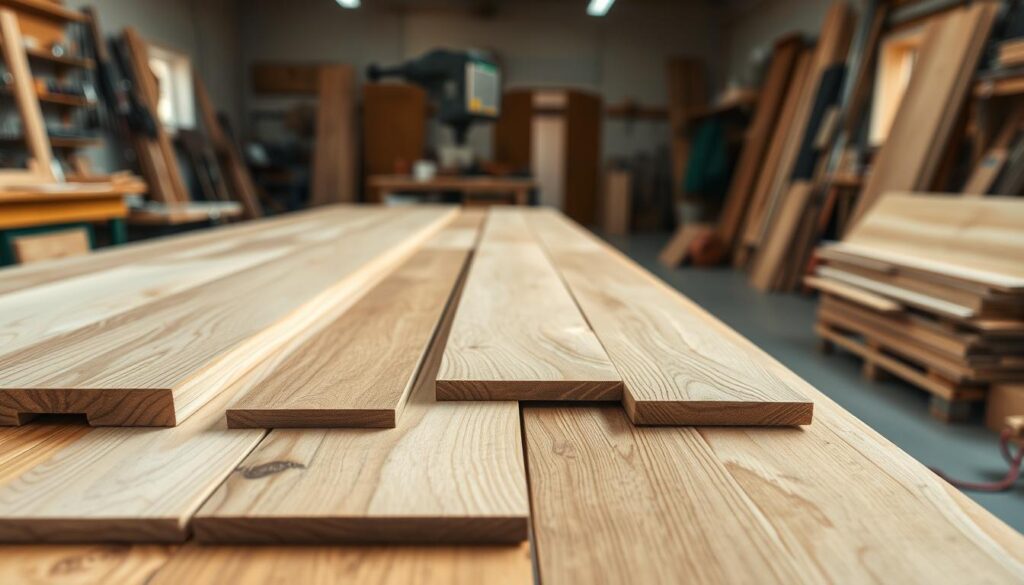
Wooden flooring is a viable solution for workshops, offering a unique blend of style and functionality. It provides a traditional workshop aesthetic while offering natural warmth and comfort underfoot compared to concrete or epoxy.
Engineered Hardwood vs. OSB/Plywood Options
When considering wooden flooring for your workshop, you have several options, including engineered hardwood and OSB/plywood. Engineered hardwood offers durability and a premium appearance, while OSB or plywood provides a more economical solution with acceptable performance characteristics.
Considerations for Wood in Workshop Environments
Using wood in workshop settings presents several challenges, including moisture sensitivity, temperature fluctuations, and vulnerability to dents and scratches. It’s essential to consider these factors when selecting and installing wooden flooring to ensure it meets your workshop’s demands.
Proper installation methods, such as sleeper systems, can enhance the performance and longevity of wooden floors. Regular maintenance, including periodic refinishing and sealing, is also crucial to protect your investment.
Specialised Workshop Flooring Alternatives
Beyond traditional options, specialised workshop flooring alternatives offer unique benefits. These solutions cater to specific workshop needs, providing improved functionality and comfort.
Foam Mats and Their Applications
Foam mats are a versatile and economical solution for workshops requiring extra cushioning. They are particularly suitable for multi-purpose spaces that may include fitness activities. Interlocking EVA foam tiles are a popular choice due to their lightweight nature and excellent shock absorption properties. However, it’s essential to understand their limitations, including vulnerability to punctures and chemical damage.
Horse Stall Mats for Heavy-Duty Workshops
Horse stall mats are designed to withstand heavy loads, making them ideal for heavy-duty workshop applications. These ultra-thick rubber mats (typically 19mm or thicker) can handle substantial equipment and provide exceptional durability. When considering horse stall mats, evaluate their cost-effectiveness compared to traditional flooring solutions.
| Flooring Type | Durability | Cost-Effectiveness |
|---|---|---|
| Foam Mats | Moderate | High |
| Horse Stall Mats | High | Moderate |
Combining Flooring Types for Optimal Workshop Performance
To maximise the efficiency of your workshop, you should consider combining various flooring materials to create zoned areas. This approach allows you to tailor the flooring to specific tasks and activities, enhancing both comfort and functionality.
Creating Zoned Areas with Different Flooring Materials
By creating dedicated zones with appropriate flooring types, you can optimise your workshop’s performance. For instance, you might use epoxy flooring in general areas for its durability and ease of maintenance, while incorporating rubber mats around workbenches and machinery to reduce fatigue and improve safety.
- Use epoxy flooring in high-traffic areas for its durability.
- Incorporate rubber mats around workstations for comfort.
- Consider modular solutions for flexibility in workshop layout.
Strategic Placement for Comfort and Functionality
flooring, such as rubber mats, can significantly reduce fatigue in areas where you stand for extended periods. Additionally, exploring transition techniques between different flooring materials can help create a cohesive look while maintaining the functional benefits of each.
Evaluating cost-effective approaches to zoned garage flooring is also crucial. Using premium materials only where they provide the most benefit can help balance your budget while achieving optimal workshop performance.
Conclusion: Making the Right Workshop Flooring Decision
The perfect workshop flooring solution depends on a multitude of factors, including your specific needs and preferences. When choosing workshop flooring options, it’s essential to consider the type of activities you’ll be undertaking, the environmental conditions, and your personal preferences.
Throughout this guide, we’ve explored various workshop flooring options, including epoxy coating, rubber flooring, PVC and vinyl interlocking tiles, and wooden flooring solutions. Each has its strengths and ideal applications, and the right choice will depend on your specific situation.
As you make your decision, balance practical requirements with budget constraints and consider your long-term workshop plans. The right flooring will enhance your workshop experience for years to come. Take your time, and don’t hesitate to seek professional advice when needed.
